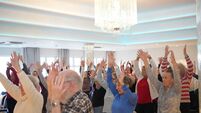Why can’t we stop buying new clothes - even in a climate AND cost-of-living crisis?

It is so easy to buy clothing now, by pushing a few buttons on our phones.
THE thrill of buying a new item of clothing fades after just four wears, according to research conducted by Oxfam.

If we are self-soothing with purchasing behaviours, we may quickly notice the feel good moments don’t last long.







 App?
App?


